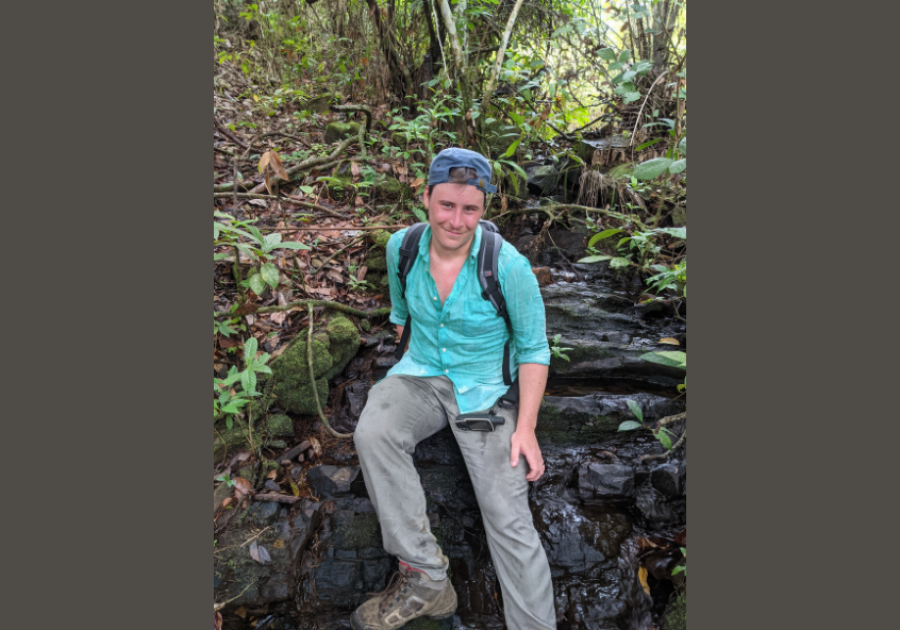
Tell us about your current research
I conduct research on an emerging viral haemorrhagic disease called Lassa fever. It is a zoonotic disease with several rodent species potentially involved in transmission to humans across West Africa. There is limited routine surveillance and the true burden of this disease in humans across the region is not well known. Even less is known about how the virus is transmitted among rodents and how it is maintained in their populations.
My research takes a One Health approach where I have support from PhD supervisors across human health, veterinary medicine and ecology. We try to cross these disciplinary boundaries to understand the effect of land use change on rodent populations and ultimately the risk to humans in endemic regions of Sierra Leone. We trap rodents in several locations in the Eastern Province of Sierra Leone, test them for evidence of prior infection with the virus that causes Lassa fever, and use these data to model the changing risk of outbreaks across the local region.
Hopefully this research will support the local Ministry of Health to understand the potential burden of this disease and support adequate resource allocation, training for healthcare workers and sensitisation of local communities to this emerging virus. Currently vaccines are being developed and we anticipate that this research can help identify priority locations for the trials to be conducted in. Further details about my research can be found on my website.
Describe your career journey so far
Prior to beginning my PhD, I had completed an undergraduate degree in Natural Sciences and a Master’s in Biodiversity and Conservation. I became very interested in the relationship between the environment and human infectious diseases and so went to medical school. Following this and after completing my foundation years (first two years of postgraduate medicine) in London, I enrolled at LSHTM to complete the Master’s in Tropical Medicine and International Health. I had wanted to do this course for a long time as it offers a combination of clinical training, through the Diploma in Tropical Medicine and Hygiene, alongside academic training through LSHTM’s Master’s level modules in statistics and mathematical modelling.
LSHTM is a fantastic institution to complete further postgraduate training in medicine, as it attracts a diverse student body providing opportunities to learn from colleagues from around the world.
The MSc programme allowed me to continue to develop my research skills and I began a PhD programme the following year. I was fortunate that I could further my research on the same topic as my MSc project, based in the Peruvian Amazon where we were investigating the risk of viral zoonotic spill over from rodent populations.
Being involved in the CMMID team on the COVID-19 response led to a position with the Outbreak Surveillance Team at UKHSA. My involvement in the COVID-19 response has helped me to develop data science skills and understand better how real-time analysis and disease surveillance can be rapidly translated into public health action to directly impact the course of epidemics and outbreaks.
What are your goals for the future?
I hope to complete my PhD by September 2023 and find a position as a post-doctoral researcher to continue my research on rodent-borne emerging zoonotic infectious diseases.
Ideally, I would also like to maintain and develop the field-work we have implemented in Sierra Leone, as it is vital to continue these types of field studies over a longer period than a PhD. It will be a challenge to identify suitable resources to do this but, hopefully under current circumstances, funding institutions will recognise the benefit of this in the context of pandemic preparedness.
Longer term I hope to be able to continue to combine my clinical knowledge and academic interests in my future career, as I find they complement each other well when trying to understand complex systems such as zoonotic disease emergence.
What’s your favourite thing about being based at LSHTM?
LSHTM is an institution with a truly global outlook. A large amount of work done by the university is focused on neglected tropical diseases, such as Lassa fever, providing insight into diseases which often affect the most marginalised populations.
Importantly LSHTM is also going through significant culture change highlighted by the “Decolonising Global Health” movement within the institution. It is good to see that the institution is supporting investigations into prior practices within LSHTM and is at the forefront of bringing these important conversations to light.
Do you have any advice or tips for other PhD students?
A PhD can be a fantastic opportunity to have time and space to pursue an area of academic research you are truly fascinated by. The topic can be very hard to identify from outside academia, so contacting relevant research groups and individuals can be hugely beneficial, if a little intimidating. PhDs can also be quite isolating so finding supportive research groups or interest groups within larger institutions can be particularly helpful.
How can people get in contact with you?
Email: David.Simons1@lshtm.ac.uk
Twitter: @David_Simons_UK
Our postgraduate taught courses provide health practitioners, clinicians, policy-makers, scientists and recent graduates with a world-class qualification in public and global health.
If you are coming to LSHTM to study a distance learning programme (PG Cert, PG Dip, MSc or individual modules) starting in 2024, you may be eligible for a 5% discount on your tuition fees.
These fee reduction schemes are available for a limited time only.
